Few rock guitarists on this planet have had such a lasting influence on so many renowned musicians as Michael Schenker. With his outstandingly fluid style, inexhaustible wealth of ideas, and instinctive feel for hooks and melodies, Michael Schenker is a living legend who, despite his longstanding and distinguished history, still impresses with his unflagging energy and drive. The blond stringsman from Sarstedt, Germany began his international career in the early 1970s with the Scorpions, achieved worldwide fame after joining British rock group U.F.O., and then seamlessly continued his exceptional global success story under his own name, as well as with acts such as Michael Schenker Group (otherwise known as MSG), Temple Of Rock, and Michael Schenker Fest. Schenker and his career, which has spanned more than five decades, are absolute exceptions in the otherwise short-lived music industry.
MSG’s “Universal” which will be released on May 27th via Atomic Fire Records will feature all the strengths of this exceptional musician: first-rate songs with anthemic melodies, catchy guitar riffs, and inspiring solos. As fans have come to expect, Schenker has once again enlisted a number of prestigious fellow musicians for the recording of his new studio production, among them, as main vocalist, Ronnie Romero (Rainbow, Vandenberg), who will also be MSG’s frontman on their upcoming tour, Michael Kiske (Helloween) and Ralf Scheepers (Primal Fear), keyboard player Steve Mann (Lionheart), drummers Simon Phillips (Toto, The Who), Brian Tichy (Whitesnake, Foreigner), Bobby Rondinelli (Rainbow), and Bodo Schopf (Eloy), as well as legendary bassists Bob Daisley (Black Sabbath), Barry Sparks (Yngwie Malmsteen, Dokken) and Barend Courbois (Blind Guardian, Zakk Wylde), with Tony Carey as a very special guest.
Chaoszine had the chance to catch up with Michael Schenker to discuss about his amazing career, upcoming European tour as well as the upcoming “Universal” album and you can read the entire interview below:
Hello from snowy Helsinki. I suppose that you’re in sunny Brighton now?
Michael Schenker: Yeah. I’m in Brighton now. We have the kind of April weather here. And it’s hard to follow. So, no one knows what’s going to happen next. “Laughs”
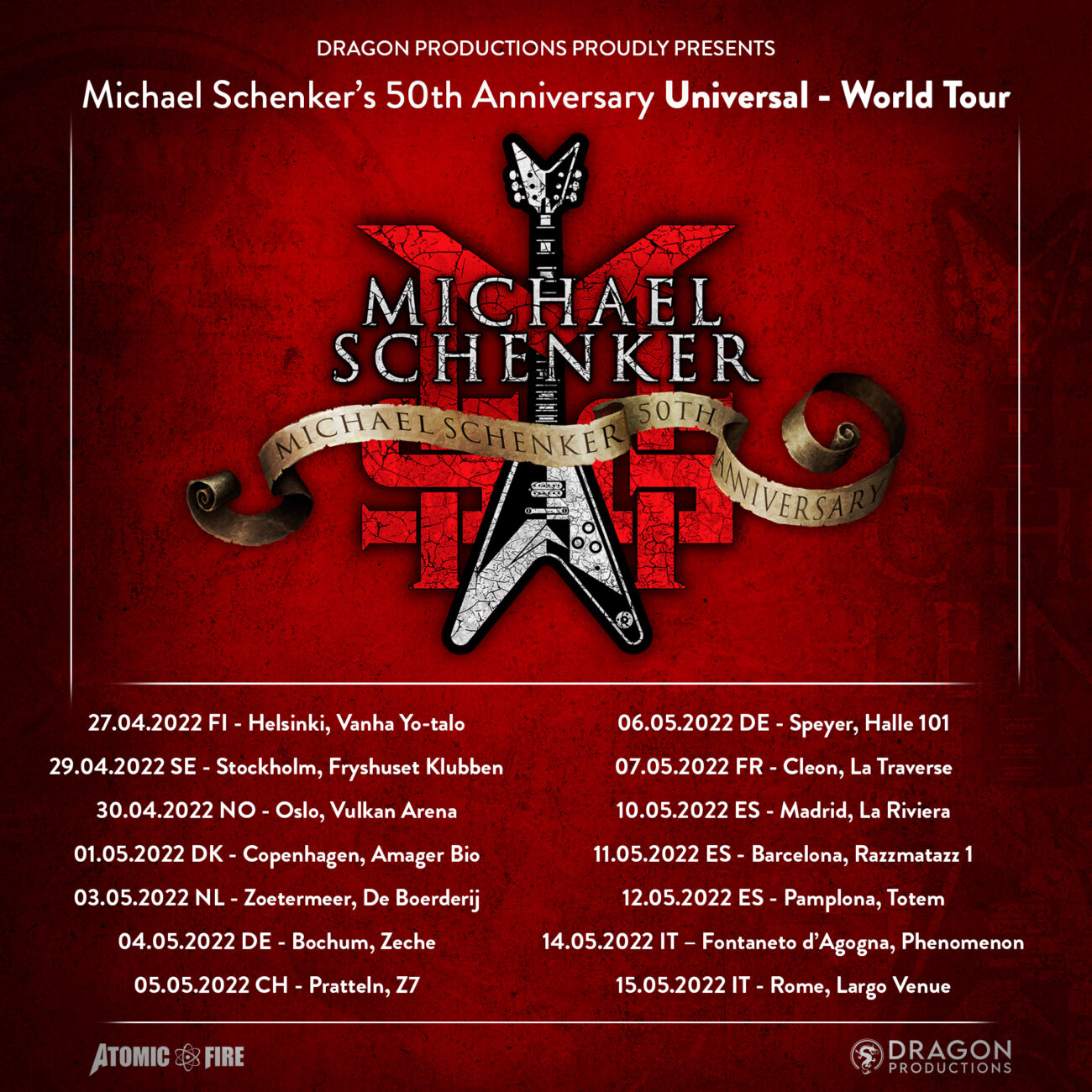
Have you started the rehearsals for the upcoming tour yet?
Michael Schenker: We already did our first part of rehearsals. And we’re doing more tour rehearsals when we get to Helsinki.
I just checked that it’d been fifteen months since we spoke last time, and now you have another album coming out, but before we go deeper into the new “Universal” album, let’s talk briefly about the upcoming tour because it’s special for us because the tour is starting from here in Helsinki. What can the fans expect from you this time?
Michael Schenker: Well, it’s just going to be a well-balanced set, you know? Old classics and new classics. And beautiful energy, and just kind of a few songs that we haven’t played for a long time. People always ask, “Oh, why don’t you play this? Why don’t you play that?” And so, I always keep the last set that I did, like last world tour, and then I go by that, and actually, I keep quite a few sets to make sure I don’t repeat myself too much. And so that we don’t overlook some old classics that haven’t been played for a while. So, it’s going to be a well-balanced set.
On this upcoming tour, Robin McAuley will sing the first leg of it, including Finland. This is the first time he’s been here since 1992 when you did a short promo tour here together. Do you still remember that?
Michael Schenker: Ah, yeah. But what happened before that? Didn’t we come to Finland with Def Leppard in 1987?
No, you didn’t because that show got canceled at the last minute, and the tour started from Sweden then.
Michael Schenker: Ah, but the funny thing is that when Ronnie Romero had to cancel at the last minute, he had a personal situation going on, I had to let him go, and then we got Robin McAuley in. The funny thing is that in 1987, we played a European tour as McAuley–Schenker Group together with Def Leppard. We did a tour together with them in Europe and then we played in almost the same countries with them that we’re going to play now. Well, as you said, we didn’t play Finland then, I guess, but we played in Sweden, Norway, Denmark, Netherlands, Germany, Switzerland, France, and Italy, you know? And I don’t think we have been back with Robin in those countries since then. So, I think that people will be pleased to see Robin, you know? Anyway, it’s going to be great to come back here and tour again. So, this could be interesting.
Now when Robin is back behind the microphone, does it mean that we will hear more songs from the McAuley-Schenker Group era. There are a lot of great songs on those albums that we haven’t heard live in a long time.
Michael Schenker: No, no, it’s not possible because the way Ronnie had to cancel, it was too short-term. So, we don’t have enough time to change the setlist anymore. So, we have to stick with the set that we have.
You mentioned that Ronnie has a personal situation going on, and that’s why he’s not able to make the first leg of this tour. Can you tell me something more about it? What is that situation he’s having?
Michael Schenker: Well, it’s a private thing, so I don’t have to talk about it. Ronnie is going to be back with us after the European tour. He’s going to do all the festivals in the summer. He’s doing America and Japan with us, and maybe by the time we do America, we already got the offer for South America. And hopefully, we will get an offer for Australia eventually.
I think it would be a kind of a dream come true for Ronnie if you go to play in his home country in Chile.
Michael Schenker: That’s right. I didn’t even think about that. Yeah, South America, of course.
You must be one of the most productive musicians in the rock scene nowadays because it’s been only a bit over a year since “Immortal” was released. Many other bands have started to play the replacing shows for the delayed ones to support the albums they had put out in 2020 or 2021, but you choose to release a new album and continue from that forward.
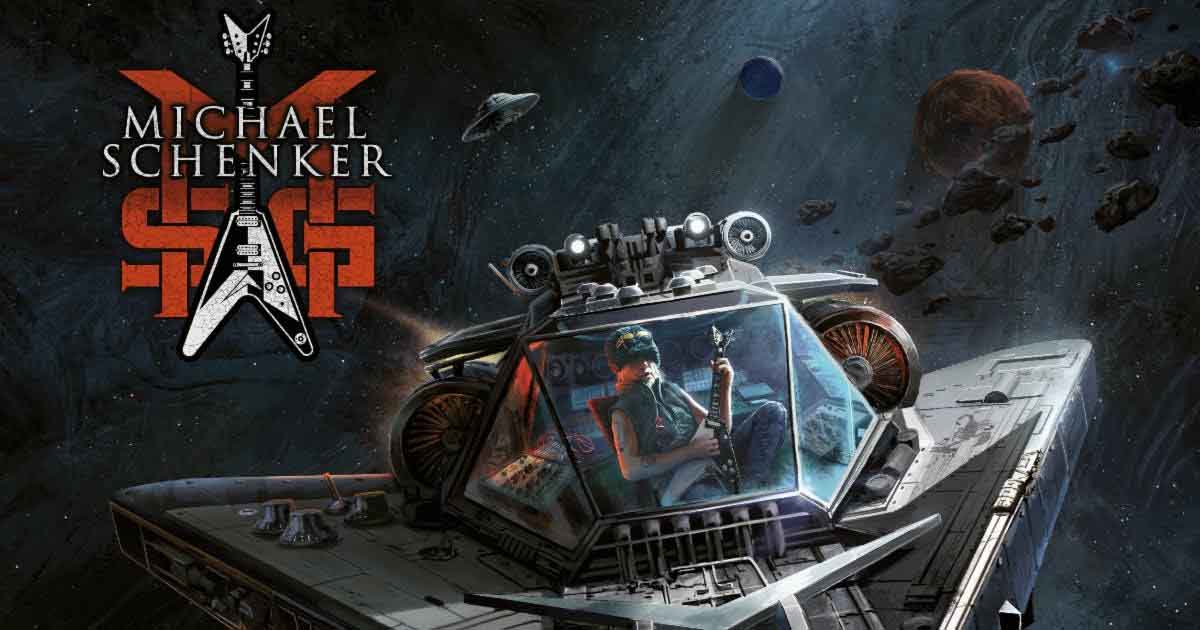
Michael Schenker: I can write on the spots because I write from within. I don’t copy a trend. Most people do; they just copy themselves. They copy each other in a trend to make money to be richer and to stay updated. And I guess they don’t believe in themselves. But I have self-confidence that I can go within myself. I don’t write for fame and money. I write because I’m an artist, and I write from within. I always say I’m a spirit on a mission, spreading the joy of music from a place of pure self-expression. And so, I go within myself, which is an endless spring of creativity. And if one decides to go there– and I do, that’s my passion. I’ve been doing this for 50 years. I don’t listen to music, and I don’t listen to others. I know the brain is like a sponge; it automatically copies other people. So, I stay away from music as much as I can. I’m a creator, an artist, and I create for myself and the consumer.
So, you are saying that you are creating all the time?
Michael Schenker: No, I create when it’s time to make a record—”Laughs” I can create on the spots. I mean, when it’s time to make a new album, that will be time to make a new album.
There are a lot of great songs on the album; let’s discuss a few of them a bit more. And let’s start with “Emergency. It’s a strong album opener and the first single off the album. Ronnie Romero really shines on that song. Tell me something more about it?
Michael Schenker: It is complicated and kind of a progressive song, but it’s still catchy. It’s kind of hard to play, and when we were listening to that music, then we thought about who should play drums on that. And then Michael Voss said, “I think we need to get Simon Philips for that. It has so many different rhythms on it.” But anyway, once it clicks and is understood, it’s a fun song to play. The record company liked it, and they said immediately, “This is going to be the first single.” So even though it was a bit progressive and not really that commercial, it’s still a very catchy and different song. So, it’s really good, and it kind of gives people a new kind of idea of what this album is like. “Oh, wow, what is this? This is unusual. This is something new.” So maybe it excites people to be curious about the rest of the album?
“Under Attack,” “London Calling,” and “Yesterday’s Dead” are all strong songs on the album. And what’s common in these three is that they all are melodic up-tempo hard rock songs, and they remind me of the classic UFO and MSG material from the 80s. Then there are a couple of really fast, heavy songs on the album like “Au Revoir,” which has some cool and insane-sounding guitar parts, and then, as an opposite for everything, there are songs like “The Universal,” which sounds like a semi-ballad to me. I would say that the word diversity is the best word to describe this album. Do you agree with that?
Michael Schenker: That’s what I said in the beginning. That I want to make sure it’s a well-balanced album. I’m glad you agree with me. (Laughs) The next singles are going to be “A King Has Gone” and “Under Attack.”
The “Universal” album has a few special guests, but it sounds more like an actual band record than the previous albums. And if I remember correctly, you told me in an earlier interview that you want to have a stable band again, and now you have it.
Michael Schenker: Yes. Ronnie Romero became our main singer, and he’s singing ten songs on this album. Basically, the main band now is Ronnie Romero, myself, Bodo Schopf, Barend Courbois, and Steve Mann. And the other players on the album, they’re not strangers. They are basically members of the extended MSG family. Barry Sparks played in MSG in the 90s, and he always emailed me and said, “I want to be your next bass player. I want to be on your next album.” And so, he almost was, but we couldn’t use him because he wasn’t vaccinated. Simon Phillips played on the first Michael Schenker Group album in 1980, and he has also played on Michael Schenker Fest albums, so he’s not a stranger. And Brian Tichy, many years ago, more than ten years ago, he was playing on the first Michael Schenker’s Temple of Rock album, the one with a temple on the cover. There was a song that Doogie White was singing, “Before the Devil Knows You’re Dead,” and Brian Tichy played drums on that. He’s been playing to us on many albums since then. He’s also a huge Michael Schenker fan, so he’s a great guy. (Laughs). In fact, all of those guys also played on the “Immortal” album. So, most of the guests we have they’re not strangers. They are a part of my extended family, and they have been playing with me before and so on.
Original MSG vocalist Gary Barden also sings on the record. I wanted him on the album because every time I write music, and if it looks like there is a space for some great low vocals, I always want to get Gary in because he has the best low voice I know of. His voice is so warm and has a great vibrato, and he always sounds so manly. It’s just beautiful, the way he sings low and so, he ended up with Ronnie Romero on the same song, “The Universe.” Ralph Scheepers also sings one song, “Wrecking Ball,” on the album. I wanted to have him on board again because he was so good on the last album, and he now did great work again.
I agree that he is a great singer. But we have one more song left, featuring not just one but a gang of entirely new guests. I’m talking about the song “A King Has Gone.” Maybe you can share the story behind the song?
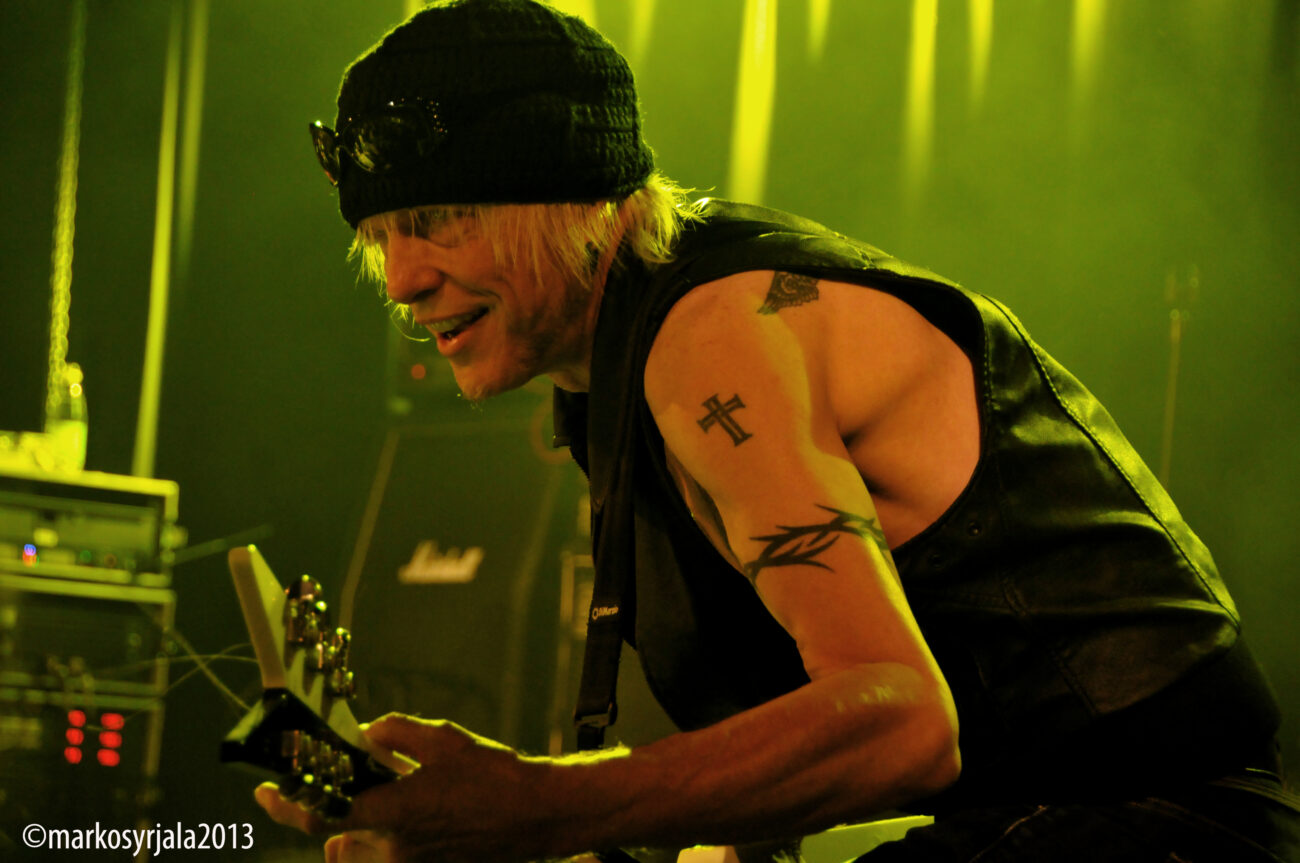
Michael Schenker: Yes, and then we have “A King Has Gone.” As you said, we have a whole line of new people there. The reason for that, how it came about—Well, nobody knew that was going to happen. I write all the music, and when I come to Germany, Michael Voss never knows what I’m going to put on tape or what I’m going to record. And so, he learns the song as I’m recording it, and then he starts writing lyrics, melody lines, and vocal melodies straight away. And then, when I come into the studio the following day from the hotel, he plays me what he had sung, what he has put together for me. He thinks of himself as a guide, place keeper or– how do you call it? He is a guide. “Laughs”
So, when I came this time back to the studio to continue working on “A King Has Gone,” he played me the vocal lines that he had created. And before he played it to me, he said that it was his tribute to Ronnie James Dio. I said, “Oh, my favorite rock singer.” Then he played it, and I told him, “Wow, this sounds incredible.” Actually, even Bobby Rondinelli complimented Michael Voss for his vocals on that song. And then Michael said to me, “What do you think if we get some of the Rainbow guys that played with Ronnie in those days to help us make a tribute to Ronnie James Dio? Not a tribute to Rainbow but Ronnie James Dio. Otherwise, some people will get it wrong.” I said, “Well, if you can get them, that would be fantastic.” And he then got them, and we ended up working with Bobby Rondinelli, Bob Daisley, and Tony Carey. What a fantastic lineup it was.
Then Markus Staiger, the head of Atomic Fire Records, thought that the song would be very suitable for Michael Kiske from Helloween. He said, “ Well, it would be great to have him sing this song. I said, “Okay, let’s try it.” So, we did that, and then when I heard the song again, I was like, “Wow, this is amazing.” Kiske sounded fantastic. I never knew he had a voice like that. That’s how that song came together. And it’s kind of outstanding too because it’s a tribute to Ronnie James Dio, and then I got all these great people to play on it. It’s a great song.
This question comes a bit out of the blue, but do I remember correctly that when you toured with Doogie White as Temple of Rock in 2015, you always dedicated “Before the Devil Knows You’re Dead” to Ronnie on that tour?
Michael Schenker: Yeah, that was Doogie’s idea. That was Doogie’s tribute to Ronnie. But this time, it was Michael Voss’s idea. [laughter]
Michael Kiske is a fantastic vocalist, but I have to ask one hypothetical question. Because you now have a former Rainbow vocalist in the band, why didn’t you let him sing “A King Has Gone”? Because it also would have been a great idea, Ronnie sings a tribute to Ronnie, if you know what I mean?
Michael Schenker: Oh, yeah, yeah. He actually did it. He did record his version of it, but then Markus Staiger asked if we could try Michael Kiske. So, we tried, and he was right because it sounded fantastic. But Ronnie’s version sounds great too. And you’re right. It would have been an interesting version on the record too. But I think that having Michael Kiske on it added a nice bonus to the album.
“The King Has Gone” is the next single on the album, and your press release says that “the song is already considered a Michael Schenker classic. What do you think of that statement?
Michael Schenker: The record company people said it because they think it is. So, it’s a winner. [laughter]
Because you’re now releasing a tribute song for Ronnie, I would like to know what kind of memories you have of Ronnie James Dio from the ’70s in particular, and when did you first hear about him?
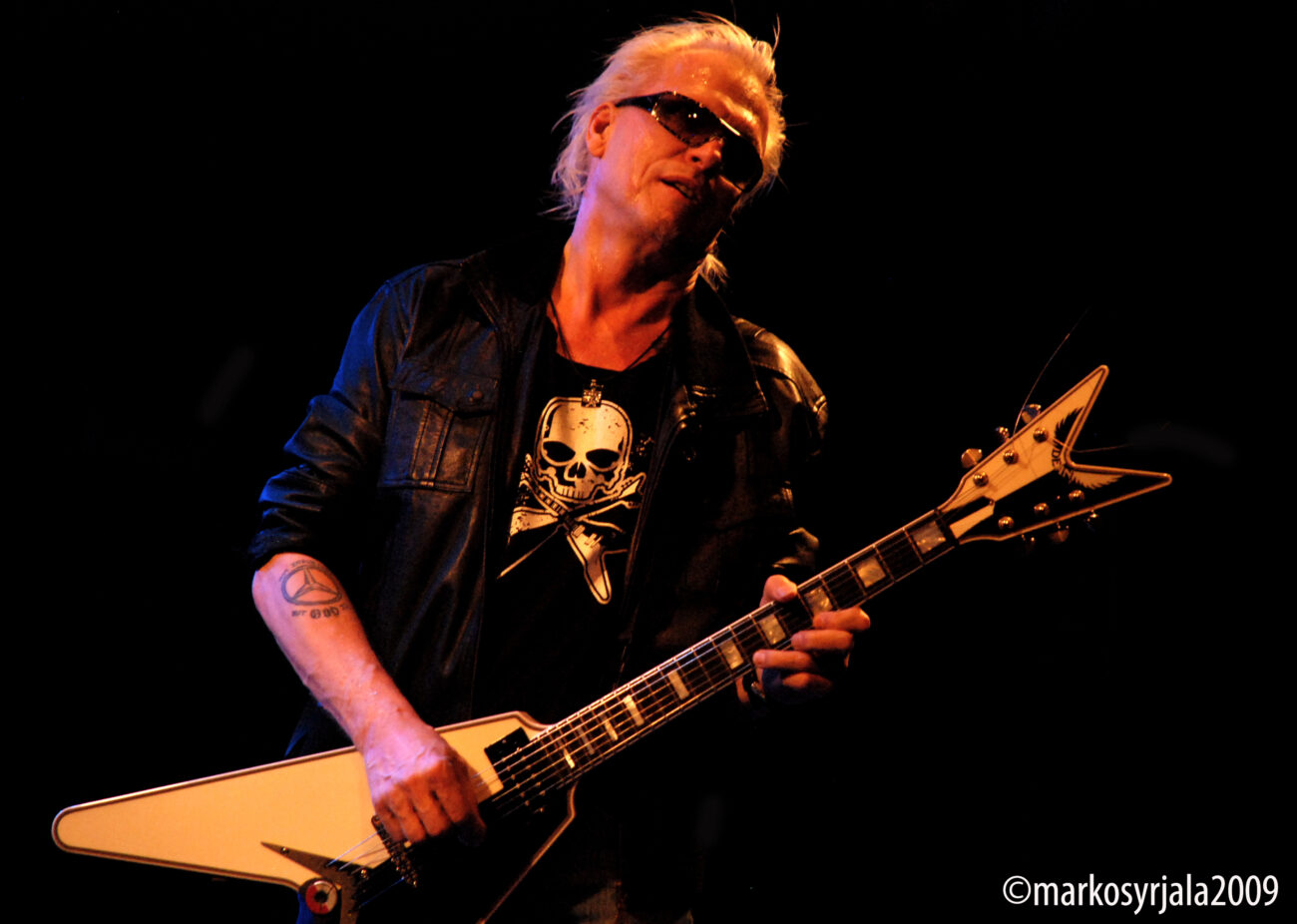
Michael Schenker: I knew about Ronnie from before Rainbow when he was on tour with Elf. It was a band called Elf. And so, the first time we…. We used to play a lot together at festivals, UFO and Rainbow. So, I got little glimpses of him every here and there. I heard “Long Live Rock N Roll,” which is fantastic, especially the vocals. And because that was—Actually, Cozy Powell played it to me because he was playing on it, and that became one of my favorite songs. But I don’t really remember many other songs from Rainbow because I never really listened to it. I would just hear glimpses at festivals, but I don’t listen to music. I don’t have a record player, or I don’t listen to music in the car or on the radio because I want to stay as pure as possible with self-expression because the brain copies everything we hear. If we consciously do it or not, we might do it subconsciously. So, I knew that from when I was 18 years old. I stayed away. And just because I love to self-express, to do it the way I think– the way I want to do it. That’s what I do, regardless of what the outcome is or regardless if it’s going to be great or well received by the audience or not. I just do it because it’s an artist’s way of doing it.
I have one more question about Ronnie James Dio. Did you ever have any plans to collaborate with him?
Michael Schenker: Oh, no, no, no. No, no, no. When I said NO to all these people who wanted me to play with them, like Ozzy Osbourne, Ian Hunter, Thin Lizzy, and Aerosmith, the list was endless. And I think it just kind of spread around. “Don’t bother asking Michael Schenker; he will reject anyway” [laughter]. So, I don’t think that Ronnie did even think about asking me because he knew that I would reject it. I would not have, no matter who asked, I would not have joined any band because I then would have to play past music, and I hate copying music anyway. But I like to self-express.
As you said, UFO often played at the same festivals as Rainbow in the 70s, so you knew each other already then. But what’s interesting is that many musicians have played with both bands over the years— Cozy Powell, Graham Bonnet, Don Airey, Doogie White, and now Ronnie Romero. Is that just a coincidence?
Michael Schenker: I always say that Ritchie Blackmore and I are living in a parallel universe. [laughter] We’re kind of doing the same things. He left the Purple; I left UFO. Then Rainbow got the replacement, and UFO got the replacement. Both of them got their replacement from the same management. And then I was doing acoustic guitar, and then Ritchie started doing acoustic guitar. And then I had Cozy come to me and join MSG. Everybody who left, or most people leaving Rainbow, would come to MSG. It was kind of very strange. And then even the Purple asked me to join them, and it was just kind of very powerful, very, very closely connected. But yet, we don’t really know much about each other, but we have very similar things happen to us in life.
And you both have a good taste of great musicians!
Michael Schenker: That’s one other thing! [laughter]
Another thing about Ritchie Blackmore. You both are among the most respected and influential guitar players in the world. So, if you think about the very early days, how did you discover Blackmore for the first time?
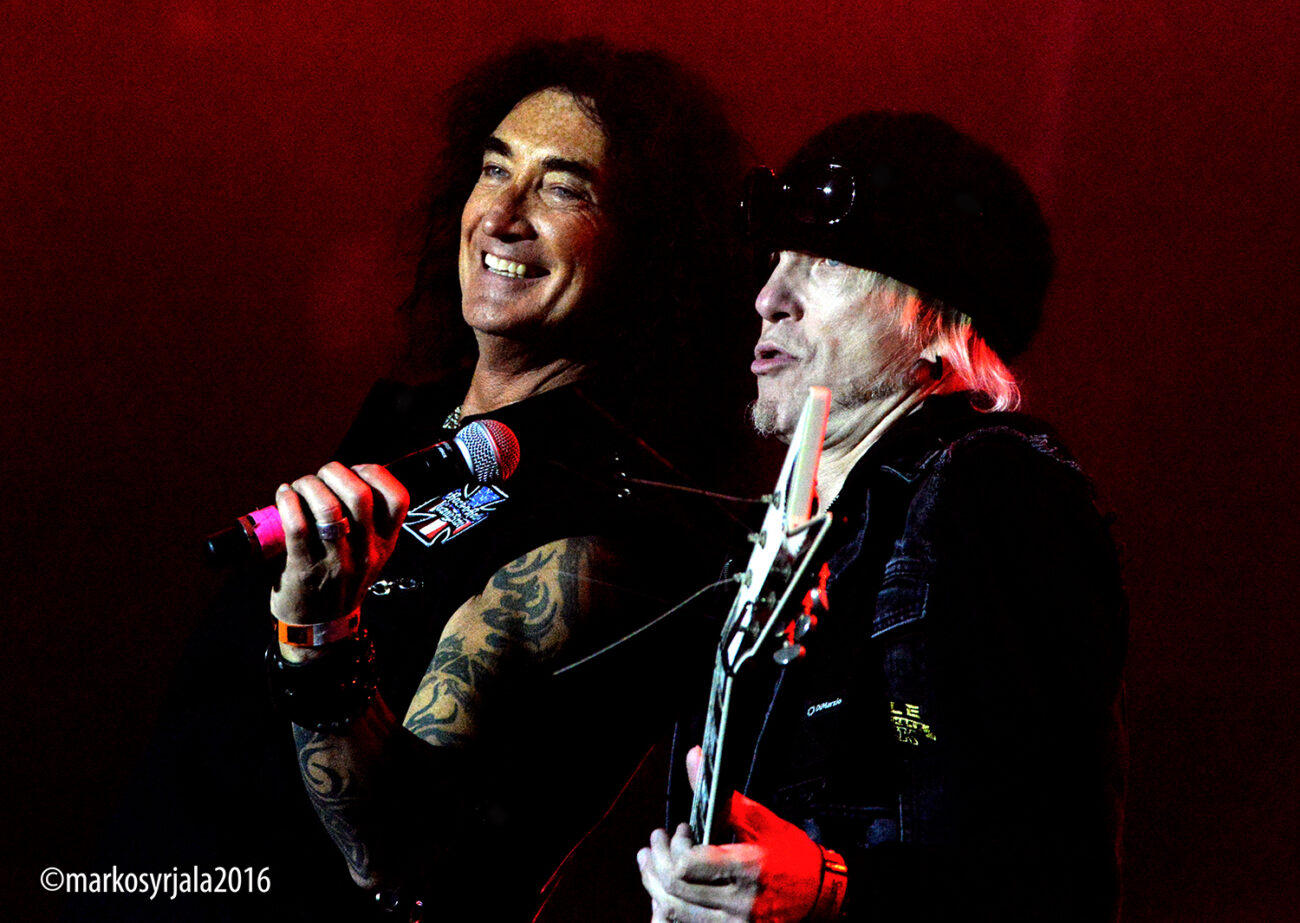
Michael Schenker: Do you know how I discovered Ritchie Blackmore? It was because of the singer, my friend, and me; we were about 13 years old. And we heard about that singer, Ian Gillan, singing really high. It was a song called “Child in Time.” We listened to the song, the real high singing, and we think like, “Oh, we have to get the album.” So, we got the album, and that’s when I discovered all the other musicians in the band. Ian Paice is really good. I even went to see a live concert when I was 13 or 14. I think it was Deep Purple, and we were there not because of Ritchie but because of the whole band. The whole band was remarkable. All the players were really good. But Rit
chie also had some unique things that he was playing, which was attractive. But I would not really– I mean, I was attracted to anybody from the late 60s, early 70s who was a great guitarist. And those guitarists, they all had their own style. Nobody was really cropping anybody. They all had their own style. It was amazing, unlike in the 80s when everybody sounded the same.
Then everyone either sounded like Eddie Van Halen or me or somebody else. But they all just copied everybody. There was no self-expression at all. But in the late 60s and the early 70s, everybody sounded like they had their own style, and that’s why it was so interesting. So, I went to do like “guitarist hunting” on festivals and stuff like that when I was 14 years old. There were so many great guitarists that I would kind of be interested in and listen to and so on. And so, it was just when Black Sabbath came out. You know that guitar sound? That was for me like, “Wow! That is amazing what he can do!” Although Tony wasn’t playing that great, but the sound he had was amazing, and so were the melodies he played. So, that’s when I got sold on that distortion, and that’s when I went my own way.
If you think about those great big names, you just mentioned and big guitar players who started their careers in the ’60s and early ’70s, not much is left from that crew anymore. Some have already died, and some have retired. Iommi and Page have retired. Blackmore is doing his own thing, and so is Jeff Beck. But you’re still here doing new albums and touring actively around the world.
Michael Schenker: True, but I’m ten years younger, and so I’m the ten years younger generation. So, Ritchie Blackmore and Jeff Beck, they are already 77. So, it may be hard when people are 77 years old to be as active as I am still. So, when I’m 77, who knows if I will be able to do this anymore?
But would you still want to make music even in ten years, if possible?
Michael Schenker: Yeah, of course, I would like to. But it’s not up to me to decide when I’m going to die or what kind of illness I get that will stop me from playing. I don’t know. Hopefully, nothing will happen. I knock on wood and play for as long as I can.
Our time seems to be up now, but there’s always time for one more question. Do you already have plans for what will happen after the upcoming tour is over?
Michael Schenker: I don’t make plans ahead. I focus on the now. Right now, I’m focusing on the tour.
That’s understandable. We’ll see you in Helsinki soon then.
Michael Schenker: Okay. Well, thank you so much for the interview.